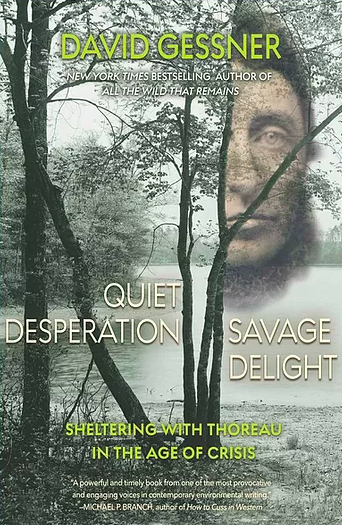“I’ve been thinking about Thoreau as COVID-19 sweeps across the country.”
Thoreau had thoughts about nature; and about death and disaster, writes Gessner. He endorsed slowing down and true withdrawal. The book, Walden is about withdrawing from the world. Gessner argues that COVID is our test run at doing more with less much like Thoreau.
One theme running through ‘Quiet Desperation, Savage Delight’ – a thought for our times and climate change, do more with less. This is a call to action to all readers.
I know it’s easier for me as a single person who never had children to try to do more with less. I really just have to take care of myself, and my two dogs. I read this book while flying west to Spokane from Boston, flying for the first time in a few years, I realize I don’t need to do it again. I think sticking close to home may be my new mantra despite my years of wanderlust and needing to travel four or five times a year.
I flew to Spokane last week for an Ironman. The race was sentimental and it was a challenge “can I still do this at 50”. I love the west and any reason to travel west of the Mississippi I will do it. I wanted to do this race and I wanted to be back racing.
Now, after airline cancellations and an unprecedented heatwave that broke records in the Pacific Northwest, I’m ready to do more with less. This book appeared in my life at a perfect time.
And while this may be a book about the pandemic and sheltering in place, it is a book about writing, and being inspired by writing (which Gessner’s books always do for me). It’s about writing about a place whether you currently live in that place or admiring it from afar. It’s a book about being inspired from writers past (Thoreau, Emerson, Montaigne) and current (Krutch, McKibben). It’s a book about the writing life and how to be a better person.
I preface this review with the idea that maybe staying close to home is a way to save the planet and learn more about the place you call home. Although, I think traveling is still a good way to make the world a better place by understanding different regions and cultures. However, maybe these desperate times are a call to save the place we call home.
“Instead of flying to the Caribbean to be happy, walk down to the creek. Explore what is close at hand” writes Gessner early on in his book.
After this trip west in 100+ degree heat, I will take Gessner’s challenge: “a dare – a bet made that staying still and finding home can be exciting, even thrilling. A bet made that doing with less can be satisfying as getting more.”
I’ve read all of Gessner’s books and he always wrote about hating the label of nature writer. But in this book he has evolved to being a nature writer:
“Suddenly I don’t mind being called a nature writer. Maybe, it occurs to me, nature writers are what this fucked-up world really need. People who connect things, who see and speak about those connections, and who listen to people and science. There are certainly worse things to be.”
I’ve always tried to write about the details of the place I’ve chosen to live. I want my stories to be about finding and writing about home.
“The need to know the birds, plants, trees, coffee shops, bars, creek streams, and the people where we live. To know our places. To tell the story of our place,” he writes.
I like how he maps his new world in North Carolina. When Thoreau writes in his journals about rivers and his observations, Gessner records everything, too. During the pandemic Gessner goes out on his boat and maps his river. He knows every inch of his place and this is what I want to do.
“We can fight for the world, but for each of us the world starts in our own neighborhoods. To know our neighbors, both human and otherwise, and to know our places is a worthwhile pursuit.”
This book has themes of nature writing and themes about how to save the world (or at least your little corner). It’s about a choice to be a better citizen in the world with tips on how to do this.
The pandemic made all of us stay still but once everything opened up again, we all started moving again. Me too. Unprecedented numbers traveling and flying, according to news reports over the Fourth of July holiday.
There is much to be said about staying put, Gessner writes, but we are a country of movers and many of us are not content to stay still. Me for one.
But after a weary trip west to the hottest place in the country last week, and simultaneously reading this book, I’m going to plant my butt in this place.
Is it really possible to be content with less? I’m going to give it a try.
Read my review of Gessner’s other works: Leave It As It Is, My Green Manifesto.
This is how I read books:


